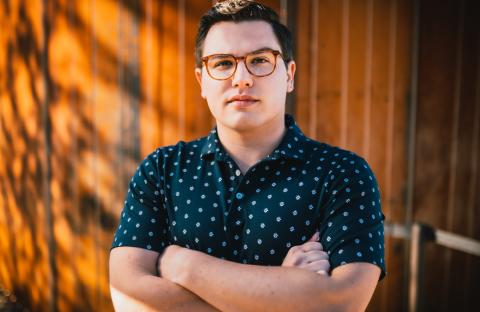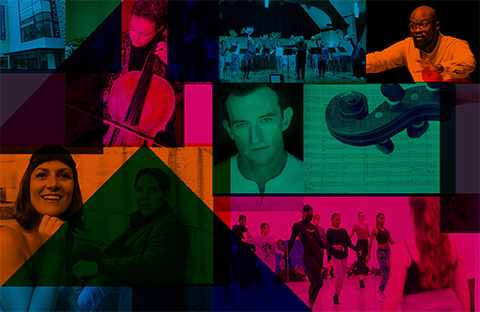From the Voice Studio to the Recording Booth

Over the last year, alum Eric Ferring (M.M. '16, opera) has accelerated his ascent as one of opera’s rising stars. Following his Metropolitan Opera debut in the 2021–2022 season singing Pong in Turandot, the tenor appeared in 32 Met performances to wide acclaim. In November, he released his first solo album, No Choice But Love: Songs of the LGBTQ+ Community, which was produced by one of his Boston Conservatory teachers: Rebecca Folsom. Here, Ferring talks to STAGES about the album and the unique working dynamic he shares with Folsom, as well as what he’s looking forward to next in his career—including a debut with Paris Opera this spring.
What inspired the concept for your solo album debut?
I’ve always believed that it’s important for artists to show audiences who they are as people. On the operatic stage, we don’t often get the opportunity to show who we are, since we’re often playing characters created hundreds of years ago. The concert stage or the recording studio, however, is fertile ground for personal exploration and discovery. As members of the LGBTQ+ community, my pianist Madeline and I always wanted to have our debut album speak to who we are as people in a sincere, meaningful way. There is so much hate and violence in our world and toward our community, whether it be assaults, shootings, or attacks on our rights to play sports or use the bathroom. It seems that, for as far as we have come in this century, there has also been a renewed effort to belittle or erase those in marginalized communities. To combat that, we want to inspire, celebrate, and love the beautiful, important musical and artistic contributions that our community has created.
Rebecca Folsom made her producing debut on this album. What made her a good fit for this project? What was it like to work with one of your teachers in this capacity?
A producer is one of the most important roles in the recording world. In classical music, the producer is usually one of only a few people in the recording booth, hearing the tracks come to life in the moment. They can be an honest ear, a comforting shoulder, an ardent supporter, and a cheerleader. A good producer knows exactly what an artist needs at any given moment to create the best product possible. It’s also important, in my opinion, that a producer already know the artist—their vision, their sound, their way of communicating and accomplishing goals. I also knew that I wanted as much of our production team to be a part of the LGBTQ+ community as the artistic team was (I’m a gay man, my pianist is a bisexual woman, and every composer, and many poets as well, are a part of the LGBTQ+ community). We wanted to celebrate our community and its immense talents any way we could.
All of those desires said, I needed someone I trusted immensely. This is my debut album—it’s my baby! Rebecca Folsom has over the years played many roles to me. First it was professor and mentor, which then transformed into confidant, advocate, colleague, and dear friend. I knew she would be perfect in the role, and I couldn’t be prouder of the work we accomplished together and the remarkable album we created. Interestingly, I think our working dynamic is in many ways the same as it was when I was a student: one built on mutual respect and a fervent desire to learn, explore, and create. But now there’s an added layer, as I’ve grown into my artistic self, to be able to collaborate in profound ways to better each other—to push each other even if we didn’t know it was possible ourselves.
What are some of your proudest professional moments? What are you looking forward to next?
My proudest professional moments have all occurred in the last year: my Metropolitan Opera debut, which was followed by 32 more performances at the Met last season; my Santa Fe Opera debut this past summer as Fenton in Falstaff; and the release of my solo debut album. As a young singer, you always dream of singing at the Met and recording an album as something “real” singers do. I’m truly blessed to have made these significant career milestones already, and I can’t wait to see what the future holds. I’m looking forward to this spring, when I will make my Paris Opera debut, and then in late 2023, I will release a chamber music album, We Have Tomorrow, with pianist Madeline Slettedahl and French string quartet Quatuor Agate.
More important than anything, however, is that I have been able to share all of these accomplishments with the many people along the way who have helped me achieve them: professors, family, friends, sponsors, and donors. There have been an incredible number of people who have allowed this small-town Iowa boy to realize his dreams on the biggest stages in the world—from buying me my first proper suit when I couldn’t afford it, to helping me pay my rent at my first young-artist program, to donating to help me create the beautiful album we just released, and more. I thank my lucky stars every day for these immense blessings, and I hope one day to pay back that generosity to others. Because, as my album title says, there’s no choice but love.
READ: STAGES 2022–2023

“From the Voice Studio to the Recording Booth" first appeared in the 2022–2023 issue of STAGES, Boston Conservatory's annual magazine.
